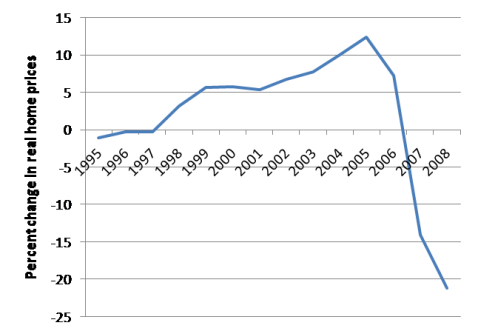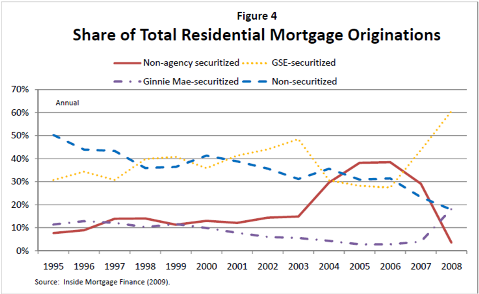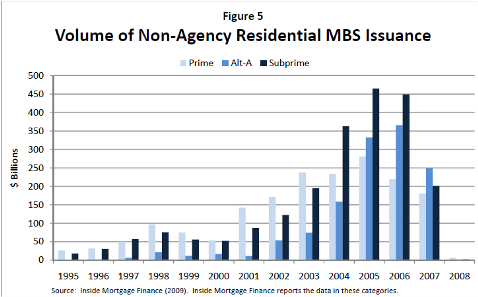Anonymous
when you hear the AEI guys asserting that Fannie and Freddie bought lots of “subprime and other high-risk” mortgages — which often gets truncated to assertions that they bought lots of subprime — you are being conned. There’s not much actual subprime in there, and the “other high-risk” turns out to be not all that high risk, and nothing at all like subprime.
But why did Fannie and Freddie have to be bailed out? Basically because they had virtually no capital, so that even though their losses as a percentage of assets were smaller than private institutions, the losses were still enough to put them underwater.
None of this is meant to defend what F&F did or how they behaved. But there’s no contradiction between the assertion that F&F were bad institutions run by bad people, and the assertion that they played no important role in creating the financial crisis. The widespread belief that they did play such a role is the result of an effective right-wing disinformation campaign, not serious analysis.
http://krugman.blogs.nytimes.com/2011/12/20/fannie-freddie-follies
In any case, two further points: first, the main problem with F&F is that they were two government entities that were privatized during the privatization craze, but of course, were still given GSE status. Just more privatizing gains and socializing risk a la post-Reagan conservative consensus.
Secondly, as bad as F&F were, there were markedly more responsible than any of the private players. Had they not existed, the economic damage would've been just as bad if not worse.
As far as the current SEC case:
The complaint is extraordinarily weak. Taking its cues from the Wallison/Pinto school of inflated data, it claims that Fannie and Freddie failed to reveal to investors the true extent of their subprime portfolios. To make this claim, however, the S.E.C. has included categories of loans, such as so-called Alt-A loans, that may have had a subprime characteristic, such as low documentation, but which were often made to borrowers with high credit scores.
http://www.nytimes.com/2011/12/20/opinion/nocera-an-inconvenient-truth.html
Anonymous
I think the point is that the private market share quadrupled while ff share went down by 1/4 prior to the meltdown. It is therefore difficult to argue that ff led or made the marketAnonymous wrote:yeah, 30% is a small part of the market. how retarded are you? seriously.
In any other environment we would look at that graph and say that a new competitor (the private mbs) entered the market and drove down prices (rates and credit terms in this case).
I think ff should be held accountable like any other institution that did bad lending. But to pretend that they set the market price is silly.
Anonymous
Anonymous wrote:TheManWithAUsername wrote:Anonymous wrote:Worst -- George W. Bush -- our kids and grandkids will be paying forever.Can't believe the number of Republican myopics on this thread.
Questions like this are pointless to discuss with the yahoos dominating the rank-and-file now. I can imagine an argument for just about any of them as best post-war or as 2nd-worst, but to pick anyone other than W as worst is just ridiculous, almost regardless of your ideology.
W kept us safe for 8 years after 9/11, stopped many many viable threats, took the war to the islamic terrorists on their turf and responded quickly, effectively and decisively to the market downturn. unemployment was low and deficits were relatively low. he should have down more against fannie and freddie, but his hands were somewhat tied.
Since when has "sitting on your hands" been interpreted as "hands were tied"?
Anonymous
yeah, 30% is a small part of the market. how retarded are you? seriously.
Anonymous
Anonymous wrote:Anonymous wrote:And I would add that F&F actually held *less* of these toxic MBS than other banks.
yet were the largest individual holders. moreover, they set and legitimized the market.




Anonymous
Anonymous wrote:And I would add that F&F actually held *less* of these toxic MBS than other banks.
yet were the largest individual holders. moreover, they set and legitimized the market.
Anonymous
And I would add that F&F actually held *less* of these toxic MBS than other banks.
Anonymous
Anonymous wrote:Anonymous wrote:Anonymous wrote:Wrong. If there had been no Fannie and Freddie, the bubble would've been every bit as large, and its deflation every bit as catastrophic.
http://media.mcclatchydc.com/smedia/2008/10/13/16/647-20081013-ECONOMY-subprime.large.prod_affiliate.91.jpg
who do you think those banks were selling their loans to?
My, what short memories we have. Have you already forgotten about the unregulated mortage backed securities?
Shh. PP's got a "truth" that flatters his political inclinations. It would be unkind to disabuse him of it.
Anonymous
Anonymous wrote:Anonymous wrote:Wrong. If there had been no Fannie and Freddie, the bubble would've been every bit as large, and its deflation every bit as catastrophic.
http://media.mcclatchydc.com/smedia/2008/10/13/16/647-20081013-ECONOMY-subprime.large.prod_affiliate.91.jpg
who do you think those banks were selling their loans to?
My, what short memories we have. Have you already forgotten about the unregulated mortage backed securities?

Anonymous
Anonymous wrote:Wrong. If there had been no Fannie and Freddie, the bubble would've been every bit as large, and its deflation every bit as catastrophic.
http://media.mcclatchydc.com/smedia/2008/10/13/16/647-20081013-ECONOMY-subprime.large.prod_affiliate.91.jpg
who do you think those banks were selling their loans to?
